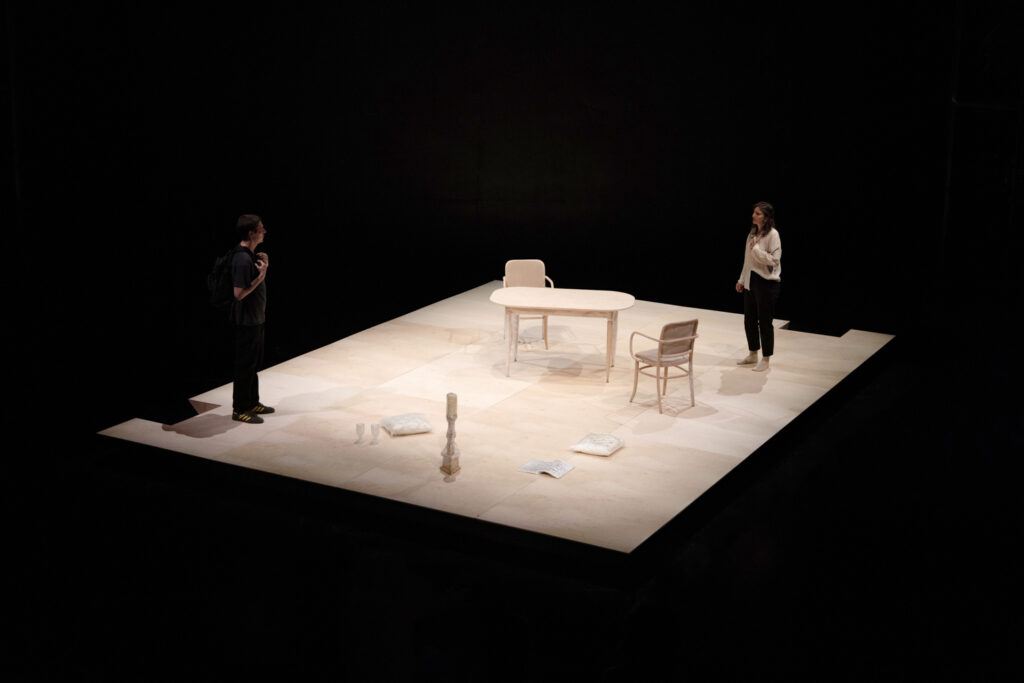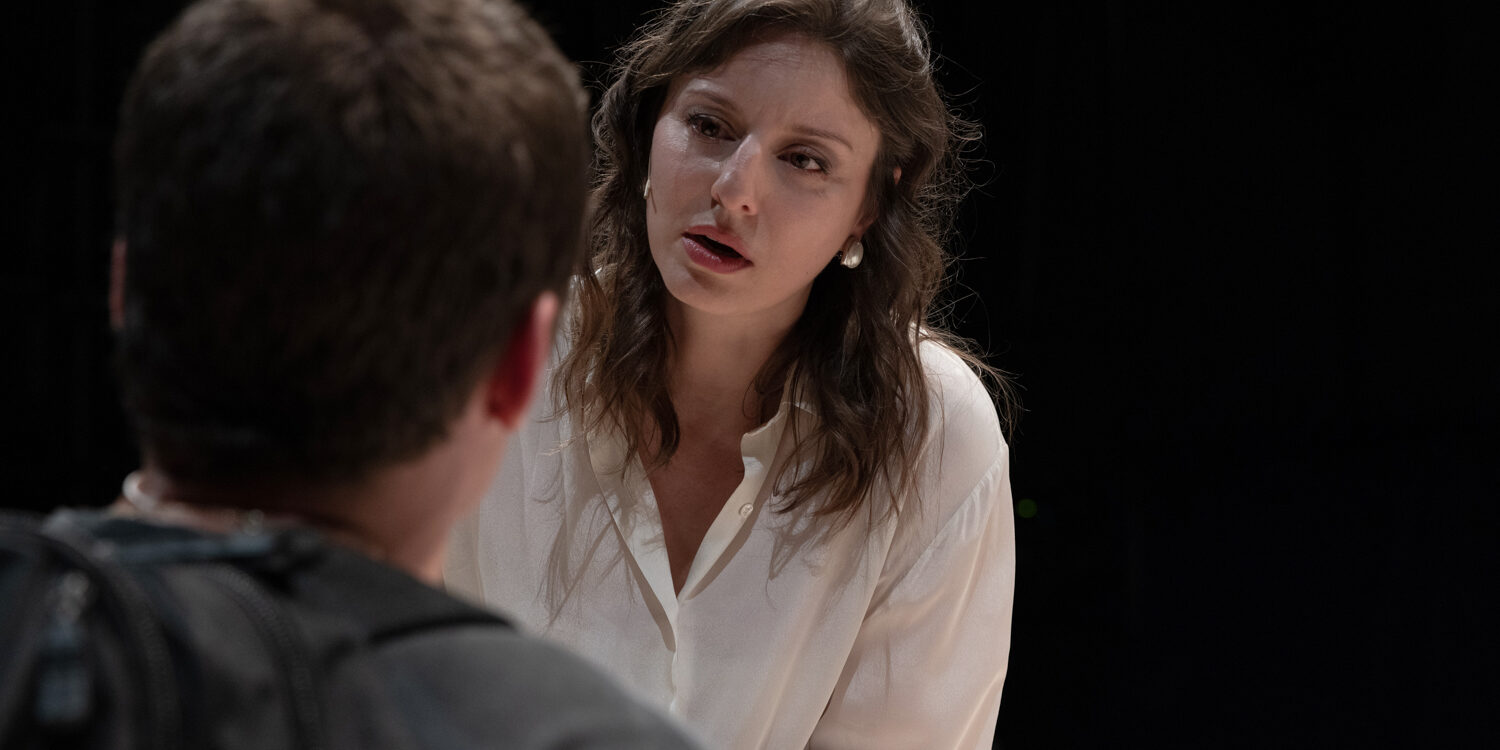Istrian National Theatre Pula, premiere 29th September 2023 (guest performance at ZKM, 6th February 2024)
Last year, Matija Ferlin was named the new artistic director of Istrian National Theatre Pula (INK) which brought a lot of excitement and enthusiasm to the national scene, and not just one a local level. For context, Ferlin is a renowned Croatian theatre director, choreographer and performer, most notable for his series of projects Stating a Play and Sad Sam. His adaptation and direction of Jon Fosse’s play Mother and Child was the first show of the season, premiering in September just before Fosse was awarded the Nobel Prize in Literature.
The stage design is simple and subtle, a square wooden platform placed diagonally with small two entrances for the two characters, the Mother played by brilliant Jadranka Đokić and the Child by Ugo Korani, whose performance pleasantly surprised me. On the side of the stage, there is other furniture, a table and two chairs in the same light wood colour, and some props, (though some of these weren’t used at all). The light wood of the scenography works as a contrast with the darkness of the rest of the empty stage so there is nothing to disrupt the audience’s gaze. Interestingly, this scenography is actually from Ferlin’s play Staging a Play: Glass Menagerie, his interpretation of Tennessee Williams’ piece which is one of the key motifs in Fosse’s Mother and Child.
The actors emerge from the darkness, under a soft light that makes them barely visible as the auditorium is still lit up. When the actors meet in the middle of the platform, the light changes quickly and the music gets louder and slowly becomes more distorted, the noise emphasizing the inner turmoil both the mother and child feel. ‘I’m so glad to see you.‘, says Đokić, dressed in white casual sweats to Korani who, in contrast, wears all black clothes carrying a black backpack that he rarely takes off during the performance. During the performance, he mostly stands in one place on the platform with his back turned to the audience, facing Đokić who, again, contrary to him is constantly moving around the stage, changing her position regarding him, as if she’s trying out different approaches to her son whom she hasn’t seen in years. With every possible moment that might change the cold and distant dynamic between them, Đokić suddenly moves from Korani, goes and collects a bubble-wrapped prop from the side of the stage, only to come back and stand opposite of him, facing the audience.
The two of them, we learn, live on separate sides of Norway. The Mother lives in Oslo, where the play takes place – in her apartment – where she moved to from the West coast after leaving her child with her parents, his grandparents, who raised him. It is implied in the dialogue that she was very young when she gave birth and then, after some time, left because she wanted to get an education and make a living on her own. Now, she considers herself a successful woman, good looking for her age, who holds a high position in the civil sector. The most interesting part of the Mother’s character is her perpetual alteration between claiming to be a feminist and ‘acting’ as one, while being misogynist and saying vile things about other women around her, especially her own mother and boss, like when she proudly announces she was happy that she gave birth to a son, not a daughter. Or when she declares that she simply can’t stand women. This is especially noticeable when she goes on a rant about how she hates her boss and believes that women should hold managerial positions. On the other hand, the Child, spent the best years of his life with his grandparents and had a strong relationship with his grandmother, much stronger then he could ever have with his Mother. He spent some time living with his father, before he started a new family, then studied abroad, in Germany and Ireland.

Mother and Child, INK Pula
The whole atmosphere of the performance is very cold, both emotionally and physically. There’s obviously tension between the mother and her child but their every attempt to communicate with each other fails. Đokić keeps yapping about herself, her life and success, and continuously interrupts Korani who’s quiet most of the time and answers her questions with one-word replies, stuttering when he tries to say something. Whenever the Mother asks him something, her questions sound more like statements. She keeps asking the same questions: what is he doing here? Did he pass his exams? She presses him to tell her something important. Throughout their conversation, it becomes clear that they disagree on many thing and don’t really have much to say to one another, even though they are lonely and long for a connection with another person. However, there is just too much resentment between them, especially from the Child who confronts the Mother for giving birth to him when she didn’t want him. The most painful part is hearing the Child say he thinks he shouldn’t have been born, that he wishes he didn’t exist and wants to kill himself.
There are only two similarities between them, according to the Mother. Firstly, they both didn’t visit their mothers for many years. Secondly, they share a love for The Glass Menagerie. Towards the end of the performance, Đokić tries to force Korani to perform scenes from the play. She takes the role of Laura and even begins to limp as she walks, while he’s supposed to take the role of Jim, the Gentleman Caller. But he refuses to perform. When she asks him what is he doing here, he answers that he’s here to see her. The performance ends with the same music and lighting composition as the beginning. This raises a question – was their conversation real? Have they even met?
These contrasts seems to be the leitmotiv of the play. Unlike Williams’ The Glass Menagerie, Fosse’s Mother and Child is a play of expectations, an examination of how such an encounter between two people, who are connected only through blood, would play out. The Child’s refusal to play the part of Jim – and of the son – is a raw display of how blood, or the waters of the womb, are in reality no thicker than a covenant.
Credits:
Author : Jon Fosse//Director/visual picture: Matija Ferlin//Translation: Dubravko Torjanac//Dramaturgy: Vedrana Klepica//Sound design Luka Prinčič//Lighting desin: Elvis Butković
Cast: Jadranka Đokić,Ugo Korani
For more information, visit: ink.hr
Nora Čulić Matošić (1998) is a student of Comparative Literature (MA) at the Faculty of Humanities and Social Sciences in Zagreb. She has written theatre criticism for the Croatian radio programme Theatralia and web portal Kulturpunkt.hr. Besides theatre, her interests are other forms of performing arts (particularly dance performances) and film.








